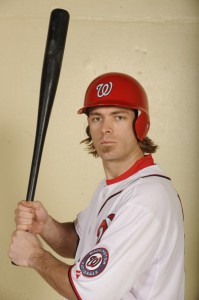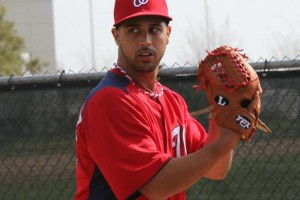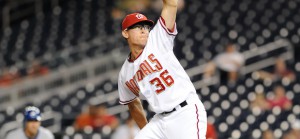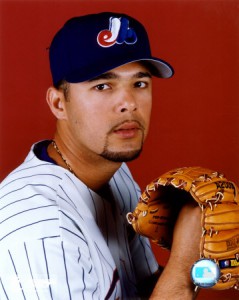
Jayson Werth is certainly our most expensive FA, by a considerable sum. Photo Mitchell Layton/Getty Images NA
The second in a series: The first looked at the Biggest/Best/Worst Trades of the Washington Nationals era and was posted in late March. Yes, it took me 8 months to return to this series, despite writing most of this post in July. Here in Part 2, we’ll look at the biggest, best and worst Free Agent signings in the tenures of both Jim Bowden and Mike Rizzo. In the last section we’ll look at Draft picks.
Ground rules for this article:
1. When considering a Free Agent we’ll only consider the FIRST signing in this list. So, for guys who have signed multiple one-year free agent contracts in a row (guys like Rick Ankiel and Chien-Ming Wang), we’ll only consider them as a single signing. For others who signed here and then left, only to come back (example: Livan Hernandez) we’ll consider them as separate signings.
2. We are considering extensions given to existing players (since they don’t fit elsewhere). You can consider an extension just a pre-emptive free agent contract.
3. We’re mostly focusing here on Major League free agents; each year we sign many minor league FAs ahead of camp. If a Minor League FA signing ends up having a decent impact on the major league team, we’ll note him (good recent example being Laynce Nix).
Just for review, here’s the tenure period of both GMs:
- Nov 2004 – Mar 2009: Jim Bowden
- Mar 2009 – present: Mike Rizzo
The team has made dozens and dozens of signings: I won’t try to go through them all here. For those interested, here’s my List of Free Agents from over the years (also available on the links section to the right of this blog). I put up a similar notes file (List of Trades and Trading Partners) from the first post of this series, also available in the list of resources on the right-hand side of the blog.
Jim Bowden Tenure: Nov 2004 – Mar 2009
Bowden’s Biggest Free Agent Signings
- 2006: Nick Johnson 3yr $16.5M
- 2007: Austin Kearns 3yr $16.5M
- 2008: Cristian Guzman 2yr $16M
- 2009: Adam Dunn 2yr $20M
I wonder sometimes if Bowden doesn’t sit in his ESPN office as he writes his blogs and ask himself what he could have done here had he had more money to spend. Look at this list; Bowden’s biggest deal in 5 off-seasons was a 2yr/$20M contract for a slugger who really had nowhere else to go that off-season. Jayson Werth will make more than that annually starting in 2014.
Bowden’s Best Free Agent Signings
- 2006: Brian Schneider 4yr extension, $2.9M
- 2007: Ronnie Belliard 1yr ML deal
- 2007: Dmitri Young 1yr ML deal
- 2008: Willie Harris 1yr $800K
- 2009: Adam Dunn 2yr $20M
Bowden’s 2007 off-season was pretty amazing, looking back. He assembled a team on the backs of Minor League Free Agents galore, one of which (Dmitri Young) ended up being our lone All-Star. The team went 73-89 and gave 145 of its 162 starts to guys who aren’t even in the league any more (exceptions: Joel Hanrahan‘s 11 starts with 6.00 ERA and late-season call up John Lannan‘s 6 starts as a 22-yr old). He was the master of the scrap heap and spun a team that should have lost 100 games into a respectable 73 win team. Too bad that luck ran out in 2008 as the team bottomed out. But you have to hand it to Bowden for these three 2007 signings; Hanrahan didn’t really pay off for the Nationals, ever, but did enable us to eventually get Sean Burnett, a valuable member of the team’s bullpen these last few years.
All things considered, I’d have to say that Adam Dunn may have been his best FA signing. Dunn’s bat was mostly wasted during his two years here, considering the unbelievably bad pitching staffs that Bowden assembled. But the combination of Zimmerman-Dunn-Willingham was a pretty fearsome 3-4-5. Ironically, NOT re-signing Dunn may also have been one of Rizzo’s best non-moves, considering Dunn’s amazing 2011 collapse and the subsequent rise of Michael Morse (who would have continued to be a bit player if the Nats still had Dunn in LF).
Bowden’s Worst Free Agent Signings
- 2007: Austin Kearns 3yr $16.5M
- 2008: Paul Lo Duca 1yr $5M
- 2008: Rob Mackowiak 1yr $1.5M
- 2008: Johnny Estrada 1yr $1.25M
- 2008: Cristian Guzman 2yr extension $16M
- 2009: Daniel Cabrera 1yr $2.6M
2008 was as bad as 2007 was good for Bowden. Nearly every move he made back-fired, some spectacularly. Paul Lo Duca hadn’t been signed for a week when his name showed up prominently in the Mitchell Report; he was released before July. Rob Mackowiak and Johnny Estrada were just stealing money; its still not clear what Bowden saw in these guys. I hated the Kearns deal, never understood what Bowden saw in the guy. Daniel Cabrera was so bad for us it was almost comical, and it was a relief when we DFA’d him after 8 starts.
But the worst FA signing has to the Guzman extension. He seemed decent enough after coming back from an injury that cost him all of 2005 and most of 2006, but Bowden inexplicably extended him for 2 years for the same amount of money that he had earned the previous four … and almost immediately his production tailed off. Its not that Guzman was that BAD in 2009 and 2010, its just that he was so vastly overpaid for what he gave the team. We flipped him for two minor league pitchers, he promptly hit .152 in 15 games for Texas and he was out of the league.
Mike Rizzo Tenure: Mar 2009 – present
Rizzo’s Biggest Free Agent Signings
- 2010: Ryan Zimmerman 5yr $45M
- 2011: Jayson Werth 7yr $126M
- 2012: Ryan Zimmermann 8yrs $100M
- 2012: Gio Gonzalez 5yr $42M
Its ironic that I had to remove three deals from this list (LaRoche, Jackson, Marquis) that would have qualified for Bowden’s “biggest deal” list. That’s because the size of these deals are just dwarfing what the team was willing to do under Bowden. Lots of pundits have (and continue to) criticized the Jayson Werth deal, and it routinely appears on anyone’s list of “Worst Baseball Contracts.” And his 2011 season confirmed just how bad this may have turned out for Washington. But a bounceback 2012, which featured Werth putting up a 125 OPS+ despite missing a ton of time with a broken wrist, showing the flexibility of batting lead-off when the team needed him, plus providing the veteran leadership and professionalism that this young team needs certainly would earn back some of that contract value. In hindsight, I think the team made this deal as a strawman, to send a message to the rest of the league that we were NOT a low-budget, poorly run team, and to pave the path back to respectability in the minds of other professionals out there that Washington can be a destination franchise.
Rizzo’s Best Free Agent Signings
- 2009: Julian Tavarez 1yr ML
- 2009: Joe Beimel 1yr $2M
- 2010: Livan Hernandez 1yr ML 900k
- 2011: Jerry Hairston 1yr $2M
- 2010: Matt Capps 1yr $3.5M
- 2010: Joel Peralta 1yr ML
- 2011: Todd Coffey 1yr $1.35M
- 2011: Laynce Nix 1yr ML
In terms of impact-per-dollar, I think the first Livan Hernandez year of his return was probably the best FA signing that Rizzo has done. Hernandez went 10-12 with a 3.66 ERA and a 110 ERA+ for less than a million dollars on the FA market. That’s roughly $90k a Win, when most teams are paying more than $1M/win for free agent starting pitching. However clearly Rizzo’s most shrewd FA deal was the Matt Capps signing. He took Capps off the scrap heap; he was released by Pittsburgh after a horrid 2009, and his half season of excellent relief for us turned into Wilson Ramos and a minor leaguer (Joe Testa), returned in trade from Minnesota. I will also mention that the value that minor league signings Julian Tavarez, Joel Peralta, and Laynce Nix gave the team was also fantastic, considering where these players were in their careers prior to joining us.
Rizzo’s Worst Free Agent Signings
- 2010: Yunesky Maya 4yr $8M
- 2010: Ivan Rodriguez 2yr $6M
- 2010: Jason Marquis 2yr $15M
- 2011: Matt Stairs 1yr ML
- 2012: Brad Lidge 1yr $1M
- Chein Ming Wang: all of them.
2010, Rizzo’s first FA class, didn’t turn out very well did it? Yunesky Maya has been a pretty big disappointment, giving the team just one MLB win for an $8M investment. Ivan Rodriguez just proved to be slightly too old to be worth the starter money he was paid; you could argue that the leadership he provided was worth the money. And Jason Marquis, bought as a stop-gap for a failed farm system, was god-awful in 2010. I won’t completely kill Rizzo for the Brad Lidge experiment; it was worth a $1M flier to see if he had anything left in the tank. Matt Stairs would have been another fine, low-cost experiment except for the fact that the team kept giving him at-bats for weeks/months after it was clear he was washed up.
For me the worst FA signing was related to the money poured down the Chien-Ming Wang rathole for three years running. The Nats ended up investing $8M total over three years to get 16 starts, 6 wins and a 4.94 ERA.
Rizzo’s Too Early to Tell Free Agent Signings
- 2011: Jayson Werth 7yr $126M
- 2012: Ryan Zimmermann 8yrs $100M
- 2012: Gio Gonzalez 5yr $42M
So far, Werth’s contract is trending as an over-pay, Zimmerman’s as an injury concern, and Gonzalez trending as a complete steal (21 wins for $8.4M AAV in 2012? That’s a fantastic return for the money). Pundits have stated that the Nats have “two 9-figure contracts but zero 9-figure players” (I read it at the time of the Zimmerman signing but cannot find the link). I think that’s slightly unfair to these players, but until Zimmerman can stay healthy enough to produce at his 2009 level, you have to admit that he may be overpaid as well. Perhaps Zimmerman’s brittle health issues can be alleviated if he makes the move to 1B, where he can continue to play gold glove calibre defense but have less of a tax on his body. This analysis obviously does not take Zimmerman’s “value” to the franchise into account, which may be unfair when considering this contract (nobody really said Derek Jeter‘s latest contract was a massive overpay considering his service to the Yankees, his “stature” as the captain and his eventual Hall of Fame induction; for the Yankees to cut him loose would have been a massive public relations gaffe).
Coincidentally, I didn’t view the contracts of guys like LaRoche, Jackson, or Morse as being specifically “good” or “bad.” I think LaRoche’s one bad/one good season plus Jackson’s MLB average season was just about on-par with expectations for their contracts. Morse’s 2011 production was pre-contract, so we’ll see how his 2013 goes.
Thoughts? Any FA signings or extensions out there that stick in your minds that you thought should be mentioned?


